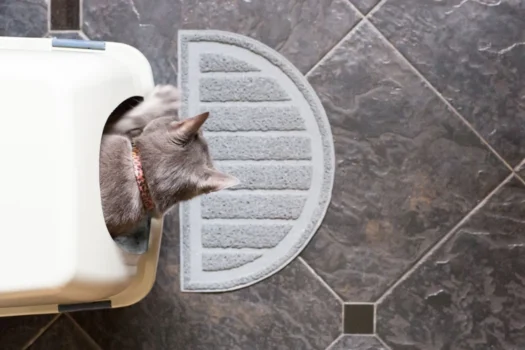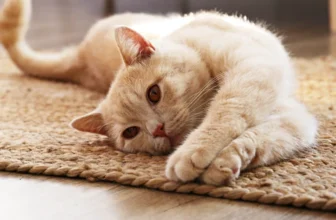As our feline friends age, their needs change, and this includes their bathroom habits. Senior American Shorthair cats, in particular, require accommodations to ensure they can access and use their litter box properly. But with so many options to choose from, where do you even start? That’s where we come in! In this article, we will walk you through the steps of accommodating litter box needs for senior American Shorthair cats. From choosing the right litter box to encouraging proper usage, we’ve got you covered with helpful tips and advice. Let’s get started!
Understanding Senior American Shorthair Cats
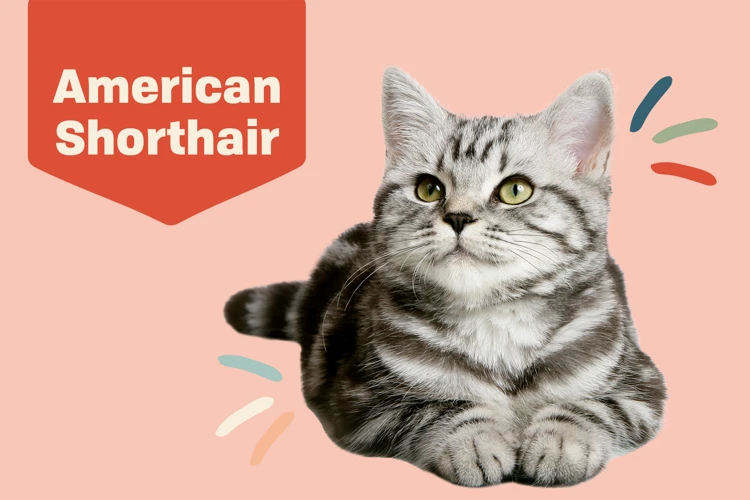
One of the keys to effectively accommodating the litter box needs of senior American Shorthair cats is understanding their unique situation. As cats age, their bodies and habits change, and this can present challenges when it comes to litter box usage. Factors such as joint pain, arthritis, and cognitive decline can all play a role in a senior cat’s ability and willingness to use their litter box. However, with the right knowledge, tools, and techniques, it’s possible to make sure your senior cat is comfortable, happy, and healthy. To learn more about how to care for your senior American Shorthair, check out our guide on Senior American Shorthair Cat Care.
How Aging Affects Litter Box Habits
As American Shorthair cats age, physical and behavioral changes can affect their litter box habits. One of the most common age-related issues is arthritis, which can make it difficult for cats to jump in and out of the box. They may also become more hesitant to climb stairs or navigate furniture to reach the litter box, leading to accidents outside the box.
Bladder and bowel control may also be affected by age, and senior cats may have a harder time holding their urine or feces, leading to more frequent accidents. As they age, cats may also experience cognitive decline, which can impact their memory and ability to remember where their litter box is located.
To accommodate the changing needs of senior American Shorthair cats, it’s important to make adjustments to their litter box area that will minimize discomfort or difficulty in accessing and using it.
Common Health Issues That Affect Litter Box Usage
As your American Shorthair cat grows older, there are several health issues that can affect their ability to use the litter box. One of the most common issues is arthritis, which can make it difficult for cats to get in and out of the litter box. This can be especially challenging if the litter box has high sides. In such cases, it’s important to choose a litter box with a low entryway or one that has a ramp that makes it easy for your cat to enter and exit.
Kidney disease is another common health issue that can affect your senior cat’s litter box habits. When cats have kidney disease, they may need to use the litter box more frequently due to increased urination. It’s important to make sure there are enough litter boxes available for your cat to use throughout the day. You should also be vigilant about keeping the litter boxes clean to prevent infection or further health issues.
Diabetes is another health issue that can affect litter box usage. Cats with diabetes may need to urinate more frequently or experience increased thirst, which can result in increased urination and accidents outside of the litter box. It’s important to monitor your cat’s drinking habits and litter box usage and to consult with a veterinarian if you suspect your cat may have diabetes.
In some cases, cats may experience constipation or other digestive issues that can affect their litter box habits. This can be caused by a number of factors, including diet and lack of exercise. To prevent constipation and promote digestive health, make sure your cat is getting enough fiber in their diet and is exercising regularly. Check out our article on best diets for senior American Shorthair cats and consider incorporating some of the recommended foods into your cat’s diet.
Finally, it’s important to keep in mind that some of these health issues can also be influenced by your cat’s mobility. If your cat is struggling to move around comfortably, they may be more hesitant to use the litter box, especially if it’s located too far away or if they have to go up or down stairs. Consider implementing some mobility exercises to help your cat move around more easily and to make the litter box easier to access. With the right care and attention, you can help your senior American Shorthair cat maintain their litter box habits and stay healthy and happy for years to come. For more information on how to prevent health issues for senior American Shorthair cats, check out our article on preventative care for senior American Shorthair cats.
Choosing the Right Litter Box
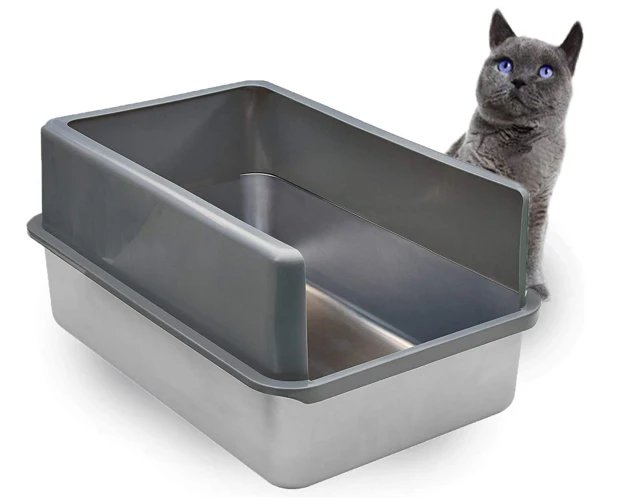
When it comes to choosing the perfect litter box for your senior American Shorthair cat, there are several important factors to consider. Size and shape, accessibility and location, and types of litter are all crucial in order to make sure your cat is comfortable and able to easily use their litter box. With so many options available on the market, it can be overwhelming to find the best fit for your furry friend. But don’t worry, we’ve got you covered with some helpful tips on how to choose the right litter box for your senior cat.
Size and Shape
When it comes to accommodating the litter box needs of senior American Shorthair cats, the size and shape of the litter box can make a big difference. Here are some tips on choosing the right size and shape:
- Consider your cat’s size: A litter box that is too small can be uncomfortable for your senior cat, while one that is too large may be difficult for them to climb in and out of. As a general rule, the litter box should be at least one and a half times the length of your cat.
- Choose a box with low sides: Senior cats may have trouble climbing over high sides, so a litter box with lower sides is a good idea. This will also make it easier for your cat to enter and exit the box.
- Try a covered box: Some cats prefer the privacy and security of a covered litter box. However, make sure the cover is removable for easy cleaning and access.
- Consider a litter box with a ramp: For cats with arthritis or other mobility issues, a litter box with a ramp can make it easier for them to get in and out of the box. This can help prevent accidents outside of the box.
By taking into account your senior American Shorthair cat’s size and physical abilities, you can choose a litter box that is comfortable and accessible for them. A well-chosen litter box can make a big difference in encouraging your cat to use the box consistently.
Accessibility and Location
When choosing a litter box for your senior American Shorthair cat, it’s important to consider not only the size and shape of the box but also its accessibility and location. Here are some tips on how to make the litter box area accessible and convenient for your aging feline:
- Low Entry: A litter box with a low entry is ideal for senior cats, especially those with mobility issues. This makes it easier for them to get in and out without having to jump or climb.
- Placement: Choose a location that is easily accessible to your cat but is also out of the way and not in a high traffic area. Additionally, it should be in a quiet and peaceful part of the house, as loud noises or high activity levels can be stressful for a senior cat. Avoid placing the litter box too close to their eating or sleeping area.
- Multiple Boxes: Consider placing multiple litter boxes throughout your home. This is especially important for senior cats who may have trouble holding their bladder or need to use the litter box more frequently. Having multiple options ensures that they always have a place to go and reduces the chances of accidents.
- Covered vs. Uncovered: Some cats prefer a covered litter box for added privacy, while others may find it too claustrophobic. Observe your cat’s behavior and preferences to determine which option is best for them.
- Lighting: As cats age, their eyesight may deteriorate, making it more difficult for them to navigate in low light. Ensure that the litter box area is well-lit, especially at night.
By considering the accessibility and location of your senior American Shorthair cat’s litter box, you can provide them with a comfortable and stress-free environment that encourages good litter box habits.
Types of Litter
When it comes to choosing the right litter for your senior American Shorthair cat, there are several options to consider. Each type of litter has its own unique properties that can affect your cat’s willingness to use the box and the ease of cleaning it. Here are the common types of litter available:
| Litter Type | Pros | Cons |
|---|---|---|
| Clay Litter | • Inexpensive • Good odor control • Easy to find |
• Dusty • Heavy • Not eco-friendly |
| Crystal Litter | • Excellent odor control • Lightweight • Lasts a long time • Less tracking |
• Expensive • Not as absorbent • Not flushable • Can be sharp on paws |
| Paper Litter | • Biodegradable • Good for sensitive paws • Dust-free • Lightweight |
• Not as absorbent • Tracking • May require more frequent changing |
| Pine Litter | • Natural and eco-friendly • Good odor control • Low tracking |
• May be too strong-smelling • Can cause allergies in some cats • Not as absorbent as clay litter |
| Wheat/Corn Litter | • Biodegradable • Good odor control • Lightweight • Flushable |
• Can be dusty • Some cats may not like the texture • More expensive than clay litter |
It’s important to experiment with different types of litter to find the one that your senior American Shorthair cat prefers. Some cats are picky about texture and scent, so you may need to try a few different brands before finding the right one. Additionally, if your cat has any respiratory issues, it may be best to avoid dusty litters like clay and opt for one that is dusty-free or low-tracking. By choosing the right litter, you can ensure your senior cat is comfortable and has a positive experience using the litter box.
Setting Up the Litter Box Area
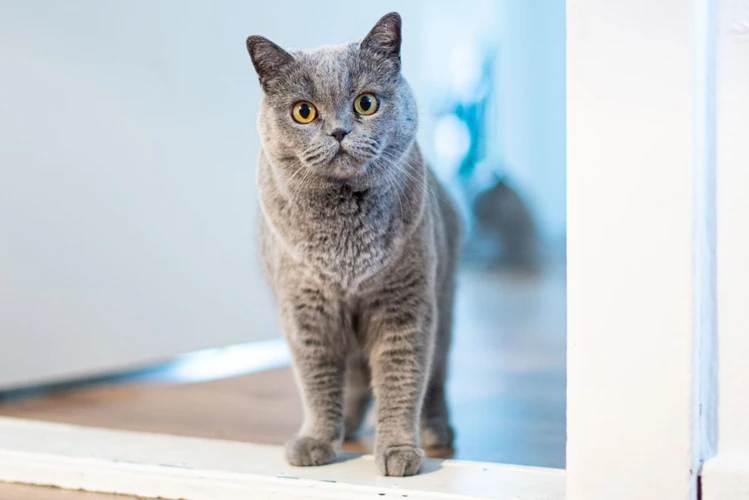
When it comes to accommodating litter box needs for senior American Shorthair cats, setting up the litter box area plays a crucial role. This is where your cat will spend considerable time performing their business, so it’s important to ensure that the area is comfortable, accessible, and well-maintained. In this section, we’ll take a closer look at the factors to consider when setting up your senior cat’s litter box area, from the right number of boxes to keeping the area clean and adding supplements. Let’s dive in.
Number of Boxes
When it comes to accommodating litter box needs for senior American Shorthair cats, the number of litter boxes is crucial. As cats age, they may suffer from several health issues that may impact their ability to use the litter box effectively. Providing multiple litter boxes in easily accessible locations can make it easier for senior cats to use them without much struggle. The rule of thumb for the number of litter boxes is one litter box per cat plus one more. So, if you have two senior American Shorthair cats, you should have three litter boxes.
Having multiple litter boxes ensures that your cats always have access to a clean litter box. This reduces competition and minimizes territorial issues between cats. If one of the senior cats has mobility issues, consider putting one of the litter boxes on the same floor, ideally near their sleeping area, so they don’t have to strain themselves.
In addition to providing enough litter boxes, it’s also essential to keep them clean constantly. Cats tend to avoid dirty litter boxes, and senior American Shorthairs with health issues may refuse to use an unclean litter box. Scoop all litter boxes daily, and clean them with warm soapy water and a mild detergent at least once per week. If your senior American Shorthair cat has a health condition that affects their urinary system, you may need to clean the litter box more frequently.
Providing multiple litter boxes in accessible locations and maintaining their cleanliness is key to accommodating the litter box needs of senior American Shorthair cats. By doing so, you can ensure that your senior cat can use it comfortably and avoid potential litter box problems that could affect their overall health and well-being.
Cleaning and Maintenance
As cats age, they may become more sensitive to a dirty litter box. Ensuring that the litter box area is clean and well-maintained is an important part of accommodating the litter box needs of senior American Shorthair cats.
Cleaning
It is recommended to clean the litter box at least once a day, preferably twice a day. This will prevent odor buildup and keep your senior cat’s litter box usage consistent. Use a litter scoop to remove solid waste and clumps, and dispose of them in a plastic bag. Empty the litter box entirely once a week or more, depending on the number of cats in your household.
Maintenance
Regular maintenance of the litter box area is also important. Sweep up any litter that may have spilled out of the box and wipe down the surrounding area with a pet-safe cleaner. Replace any litter mats or liners as needed. Be sure to also check the litter box for any signs of wear or damage and replace as needed.
To keep the litter box odor-free, consider using a litter deodorizer. Some litter brands also offer odor-control products that can be added directly to the litter.
Table:
| Action | Frequency |
|---|---|
| Clean litter box | At least once a day, preferably twice a day |
| Empty litter box entirely | Once a week or more |
| Sweep up spilled litter | As needed |
| Wipe down surrounding area | As needed |
| Replace litter mats/liners | As needed |
| Check litter box for damage | As needed |
By maintaining a clean and well-kept litter box area, you can help your senior American Shorthair cat feel comfortable and encourage consistent litter box usage.
Adding Supplements
As your senior American Shorthair cat gets older, they may benefit from some supplements added to their diet to help with litter box usage and overall health. However, it’s important to consult with your veterinarian before adding any supplements to their diet, as some may interact with medications or exacerbate existing health issues.
Here are some supplements that may help with litter box usage in senior cats:
| Supplement | Benefits |
|---|---|
| Probiotics | Can help regulate gut health and improve digestion, reducing the likelihood of constipation or diarrhea. |
| Fiber supplements | Can help keep stools regular and prevent constipation, which can cause cats to avoid the litter box. |
| B-vitamins | May help reduce stress and anxiety in cats, which can be a contributing factor to litter box avoidance. |
| Joint supplements | May help alleviate joint pain and stiffness, making it easier for senior cats to get in and out of the litter box. |
Again, it’s important to discuss any supplements with your veterinarian before adding them to your cat’s diet, as some may not be appropriate for their specific health needs. Additionally, supplements should never replace a balanced and nutritious diet.
Encouraging Litter Box Usage
Ensuring that your senior American Shorthair cat is using their litter box regularly can be crucial in maintaining their overall health and well-being. However, as cats age, they may experience changes in their litter box habits, which can be caused by several factors. Encouraging litter box usage in senior American Shorthair cats can require some adjustments and extra attention. This section will outline effective strategies to optimize your cat’s litter box experience and promote their continued health and happiness.
Positive Reinforcement
Positive reinforcement is a great way to encourage a senior American Shorthair cat to use their litter box. Remember to celebrate your cat’s successes and reward them for using their litter box appropriately. Here are a few ways to positively reinforce good litter box habits:
| Method | Description |
|---|---|
| Verbal praise | Use your voice to praise your cat when they use the litter box. Use soothing tones to calm them down and encourage them to use the litter box in the future. |
| Treats | Give your cat a small treat after they use the litter box. This incentive works well for most cats, but make sure that you don’t overfeed them. |
| Playtime | Engage your cat in play after they use the litter box, as it acts as an added bonus. They will associate using the litter box with playtime and feel more inclined to use it in the future. |
| Litter box location | You can also simply move the litter box to a location your cat prefers. If your cat seems reluctant to use the box in its current location, consider moving it to a quieter or more accessible spot. |
Senior American Shorthair cats take time to adjust to new litter boxes and litter materials. Stay patient and consistent in positively reinforcing good litter box habits for your furry friend. If they continue to have accidents, consider consulting with your veterinarian.
Managing Stress
As cats aged, they may become more stressed due to various reasons such as changes in their environment, health issues, and cognitive dysfunction. Stressful situations in senior American Shorthair cats can lead to inappropriate elimination behavior. It’s important to manage stress to encourage regular litter box usage.
One way to manage stress is by providing an appropriate environment for senior American Shorthair cats. This includes creating a comfortable and safe space that they can retreat to when they feel threatened or anxious. Designate a quiet area of your home for your cat where they can feel secure, by providing a cozy bed or perch.
Another way to manage stress is by providing your cat with mental and physical stimulation. Invest in cat toys and engage in interactive play sessions with your cat. This will help to reduce stress levels and provide them with a healthy outlet for their energy.
Additionally, some cats benefit from pheromone therapy, such as Feliway. This helps to create a calming environment for cats by mimicking the pheromones that cats produce naturally when they feel happy and content. Consider using pheromone diffusers near your cat’s litter box area or in the room where they spend most of their time.
It’s important to note that stress in senior American Shorthair cats can also be a sign of an underlying medical issue. If your cat is exhibiting signs of stress, it’s important to have them evaluated by a veterinarian. Your veterinarian can help to identify any potential health issues and provide treatment options to manage stress.
By managing stress in senior American Shorthair cats, you can help to encourage regular litter box usage and prevent inappropriate elimination behavior. Incorporating environmental enrichment and consulting with a veterinarian are important steps in ensuring your cat’s health and well-being.
| Managing Stress in Senior American Shorthair Cats | |
|---|---|
| Provide a comfortable and safe space | Designate a quiet area of your home for your cat where they can feel secure, by providing a cozy bed or perch. |
| Provide mental and physical stimulation | Invest in cat toys and engage in interactive play sessions with your cat. |
| Consider pheromone therapy | Use pheromone diffusers near your cat’s litter box area or in the room where they spend most of their time. |
| Consult with a veterinarian | Have your cat evaluated by a veterinarian to rule out any underlying medical issues. |
Consulting with a Veterinarian
Cats in their senior years often experience age-related health problems that may affect their ability to use the litter box properly. If you’ve tried all the previous steps and your senior American Shorthair cat is still experiencing litter box issues, it’s important to consult with a trusted veterinarian.
Here are some reasons why consulting with a vet is crucial:
- Diagnosis: A veterinarian can perform a checkup to help diagnose any underlying medical conditions that may be affecting your cat’s litter box usage.
- Treatment: Once diagnosed, a vet can recommend appropriate treatment options, including medications or dietary changes, to improve your cat’s overall health and litter box habits.
- Behavioral issues: A vet can also assess any potential behavioral issues that may contribute to litter box problems and recommend training or other behavior modification techniques.
- Prevention: Regular check-ups with a veterinarian can help catch any health issues early, so they can be addressed before they become more serious problems that affect litter box usage.
Remember, a veterinarian can be an invaluable resource when it comes to addressing your senior American Shorthair cat’s health concerns. Consult with them if you notice any changes in your cat’s behavior or litter box habits, as early intervention can lead to a better outcome.
Conclusion
In conclusion, accommodating the litter box needs of senior American Shorthair cats is an important aspect of providing them with a comfortable and healthy life. As cats age, their litter box habits can change due to various factors such as mobility issues, health conditions, and stress. Therefore, it is crucial to choose the right litter box, set up the litter box area correctly, and encourage proper litter box usage through positive reinforcement and stress management.
When choosing the right litter box, it is important to take into consideration the size, shape, accessibility, and location of the box, as well as the type of litter used. Keeping the litter box area clean and well-maintained, with the appropriate number of boxes, can also help to encourage proper litter box usage, as can the addition of supplements to aid with urinary tract health.
Positive reinforcement, such as rewarding good litter box behavior, can be an effective way to encourage continued appropriate usage. Additionally, reducing stressors in the cat’s environment and consulting with a veterinarian to address any underlying health issues can also help to improve litter box habits.
In summary, providing senior American Shorthair cats with an appropriate litter box setup and encouraging proper usage can greatly improve their overall wellbeing. By taking the necessary steps to accommodate their litter box needs, cat owners can help their furry companions thrive in their golden years.
Frequently Asked Questions
How do I know if my American Shorthair cat is a senior?
Cats are generally considered seniors when they are around 7-10 years old.
Can changes in litter box habits be a sign of health issues?
Yes, changes in litter box habits can indicate health issues such as urinary tract infections or kidney disease.
What size litter box should I choose for my senior American Shorthair cat?
Choose a litter box that is big enough for your cat to comfortably move around in and can accommodate their size. A good rule of thumb is to choose a litter box that is 1 ½ times the length of your cat from nose to base of tail.
What types of litter are best for senior American Shorthair cats?
Senior cats may have sensitivities to certain types of litter, so it is best to choose a litter that is non-toxic and fragrance-free. Clumping litter can also be a good option as it makes cleaning the litter box easier.
Should I have more than one litter box for my senior cat?
It is recommended to have at least one litter box per cat, plus an extra one. For senior cats, having multiple litter boxes can provide easier access and reduce stress.
How often should I clean my senior cat’s litter box?
Litter boxes should be cleaned at least once a day. For senior cats, it may be necessary to clean the litter box more frequently to prevent accidents.
What supplements can I add to my senior cat’s litter box area?
Supplements such as pheromone diffusers or calming sprays can be added to the litter box area to help reduce stress and anxiety.
Can stress affect my senior cat’s litter box habits?
Yes, stress can cause senior cats to avoid using the litter box. This is why it is important to address stressors and create a comfortable and safe litter box area.
How can I encourage my senior cat to use the litter box?
Positive reinforcement, such as treats and praise, can be used to encourage your senior cat to use the litter box. It is also important to provide easy access and a comfortable environment.
When should I consult with a veterinarian about my senior cat’s litter box habits?
If your senior cat’s litter box habits have changed suddenly or significantly, it is important to consult with a veterinarian to rule out any underlying health issues.

